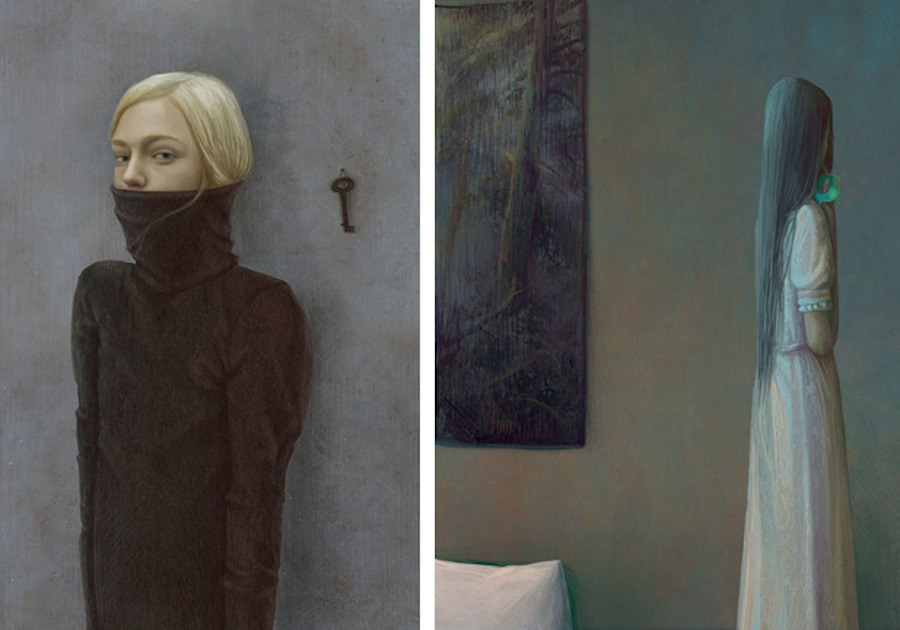Last time in Beauty and Her Beast, we discussed how a man unbecame a beast because of love. And/But there are other kinds of beasts – the charming humans who are monsters within. No amount of love can change that.
Perhaps there’s no better tale that portrays this than Bluebeard written by Charles Perrault in 1697. There are many versions and retellings of the story, though the one I’ll discuss here is by Perrault, and perhaps we’ve all also heard other stories, usually beginning with an anecdote about someone who knew someone who knew someone who had seen the real proof of Bluebeard’s horrific actions.

Bluebeard by Hary Clarke
The story goes like this: A girl married a rich blue-bearded man. Soon after they wedded, he told her that he needed to go on a long business trip and gave her the keychain to all the rooms and boxes of jewels in the house, telling her that she can do as she pleases and to “make a good cheer.” However, he emphasized that there is one key to a tiny closet and it is forbidden. “If you happen to open that door, you may expect my just anger and resentment.”
Obviously, the first thing that our young maiden did after he left is she ran to the forbidden door and opened it. What she found inside was horrific: The floor was awash in blood, containing the murdered corpses of Bluebeard’s previous young wives.
Terrified, she dropped the key into the pool of blood and no matter how much she tried to clean it after, the key remained stained.
That very night Bluebeard returned home telling her that his trip had suddenly concluded. Trembling, she pretended that nothing had happened but Bluebeard noticed that the key to the forbidden room was missing from the keychain.
The girl tried to act surprised and unknowing, saying that she hadn’t even noticed it was missing, but Bluebeard became even angrier screaming, “You do not know? But I know, Madame. You opened the forbidden door. Very well. You must now go back and take your place among my other wives.” Tearfully, she somehow managed to delay her death by pleading for some time to say her prayers, knowing that her brothers were to come later that day and could possibly save her. In the evening, just as Bluebeard raised his sword to chop off her head, her brothers came rushing in and killed him. The story has a happy end as Perrault tells us that she married again to a very worthy and wealthy gentleman.

Gilles de Rais by Éloi Firmin Féron
This tale is actually quite different from other Perrault’s tales which tend to be gentle and romantic. It is believed that he actually drew his inspiration not only from other demon-like lovers and bridegrooms, but from the historical figure of Gilles de Rais, a fifteenth century Marshal of France and companion at arms to Joan of Arc.
De Rais was a law onto himself and was found guilty of killing over 140 boys (though the real number was close to 300) whose bodies he then buried in his castle.
There are also many other stories during those times of wealthy men murdering their wives and children, including Cunmar, the ruler of Brittany in the mid-sixth century, who killed his pregnant wife as she was trying to escape into the woods. Apparently, prior to her death, she had started seeing bloodstained ghosts of his previous wives who were warning her that he’d kill her too.
This is a story about manipulation, power, control, money and, of course, violence in a most horrible game-playing way. It feels similar to a modern day serial killer movie and as any serial killer, Bluebeard is a character who fascinates us as well as disgusts us. Through his perspective, his wives were given a chance to obey him but they didn’t, so they had to be punished. Poor him. And of course, it’s true that his new wife also didn’t obey him. But as we read more closely we will begin to get the feeling that he is actually quite delighted by the events unfolding; he is delighted by her weakness and disobedience rather than being hurt by it. He enjoys punishing her and uses her “betrayal” as an excuse to be cruel. “She brought it on herself” is something that all bullies, narcissists and predators say – it’s an old trick to shift blame, justify violence and justify abuse of any kind, whether verbal, emotional or physical, and to continue to be horrible towards others.

Bluebeard by Walter Crane
Like all other monsters in disguise and false suitors, whether in folk tales or real life, Bluebeard’s wealth and charm serve to distract from the natural suspicions of his mysterious past and the rumours of his missing wives. He temps his victims by courtly manners, charms, gifts and flattery, while preparing the traps and tricks to soon kill them. In most versions of this tale, the girl is portrayed as someone who marries solely for money and her action to open the forbidden door is called “disobedience.” This is different from some older versions of these story narratives, where curiosity and disobedience, combined with courage and cleverness, are what save the heroine from marriage to a monster, death or just serving the devil. Sure, perhaps she isgreedy, but is greediness a justifiable reason for murder? Is anything a justifiable reason for murder?

Bluebeard by Arthur Rackham
Some have argued that “curiosity kills the cat” and the girl shouldn’t have opened the forbidden door. But the dude was a psycho killer; we can’t realistically expect that they would have lived happily ever after even with her obedience. Some even believed that he tricked her by giving her the key, and by emphasizing that she shouldn’t go in, he is only tempting her to disobey him so that he can then have a reason to kill her. Psychologically, he’d want to continue to play out the narrative of his inner monster and self-identity of the man betrayed by his wives and was thus rightfully seeking justice; so, it is inevitable that he would, whether consciously or unconsciously, create situations, in which any woman would justify his violent tendencies.
Psychologist Bruno Bettlheim wrote that Bluebeard is “a cautionary tale which warns: Women, don’t give in to your sexual curiosity; men, don’t permit yourself to be carried away by your anger at being sexually betrayed.”
In her essay “The Wife Killer,” Lydia Millet reflects on Bluebeard’s enduring allure stating that “Bluebeard retains his charm by being what most men and women feel they cannot be: an overt articulator of the private fantasy of egomania … he is the subject that takes itself for a god.
He is omnipotent because he accepts no social compromise; he acts solely in the pursuit of his own satisfaction.” She goes on to comment that “between an egotist with high expectations and a sociopath stretches only the fine thread of empathy and identification.”

Bluebeard by Gustav Dore
Bluebeard, in its essence, is actually a story of initiation into the maturity of a woman’s psyche.
Developing a relationship with our wild nature is an essential part of our individualization, especially for women.
But in order for us to do that, we must be able to courageously walk into the dark forest while also not become trapped, captured or killed there. Bluebeard is this kind of captor – a dark man, an innate predator, who inhibits our inner wildlands.
We can encounter predators within our minds, and also from the external world. Bluebeard may come in many shapes but he is always a light-stealer and consciousness killer.
Losing touch with our instincts makes us susceptible to become his prey – because we become less discerning, easily charmed by the surface of things, and too willing to overlook the red flags.
Moving from girl to woman, naivety must be outgrown. It’s a harsh lesson but a needed one, otherwise we’ll only ever skip the fields and pick the flowers, unknowingly. Like Persephone.
Persephone was, in a way, untouched by life, until one day she plucked the flower Hades had planted for her, and this opened the doors of the underworld, leading to her abduction by him. But it was the arrival of this dark lord, that allowed her to become queen later on. In the darkening, was a deepening. A deepening of her own senses, maturity, strength, intuition, instinct and true power that came from understanding the shadows and fears, and rising above them.

Bluebeard by Rebecca Yanovskaya
The truth is that all of us as women have fear within us – it is ingrained in our DNA. But many are so used to living with it, that they don’t even realize it. This leads to a whole lot of problems because when we don’t acknowledge these inner things, we start projecting them, and manifesting them, outward. We shouldn’t live in those fears, and we shouldn’t be trapped them – but we also shouldn’t live in denial, emotional immaturity, and naivety. We must acknowledge our shadow sides, so that they don’t become our masters.
This inner predator wants complete control – and will try to overpower us in all ways possible, mainly by suppressing our innate powers and wild nature of our soul. In order for us to keep him in check, we must remain in possession of our powers such as our insight, instinct, discernment, intuition, fierce loving, sharp sensing, keen vision, natural healing, and wild fires of creativity.
Bluebeard lurks at the edges of our lives, waiting and watching for an opportunity to oppose and suppress us. Like all dark forces, he is the one who wants to invert everything that’s good, everything that’s of love, purity and truth.
In some versions of the story, Bluebeard is said to have been a “failed magician” though he didn’t like to admit it – and instead, he concentrated his efforts into killing his wives.
A failed magician becomes someone who uses dark forces, dark rituals and manipulative tactics, because, in reality, he doesn’t have true inner powers. People who practice black magic, for example, are those who just don’t have enough real power within them and the only way for them to advance in anything is by trickery – rather than by their own talents, skills and energy. True magic comes from within.

Bluebeard by Edmund Dulac
As a failed magician, Bluebeard is also the voice that criticizes us, doubts us, and wants us to feel powerless and isolated. Because only if we feel small enough he’d be able to take dominion and control over us. He says “Don’t open the door”, he says that we shouldn’t learn more, discern more, and enlighten ourselves. He is the establishment that says “No” to truth and human rights – and wants us to live without information, so that we can’t discern truth from lies. He wants to numb us, dumb us, and devalue us; he wants us to focus only on the material possessions and the surface of things. He wants us to engineer ourselves into smallness. And to stay small, so that he feels bigger.
He wants to limit our potential and the beautiful creative expression of our soul.
He wants us to see only doors.
In reality, he is incredibly lonely and empty inside. He sits alone in a dark corner, unloved and tiny.
By having an understanding of, and even compassion for, “him” – for the part of us that sometimes overtakes us in doubt and fear and shame and guilt and feelings of powerlessness – we can become more understanding of ourselves rather than project him outward. We don’t have to marry a monster to know that some people are monsters and shouldn’t be trusted. We don’t have to be killed to learn that we shouldn’t trust all charming gentlemen knocking on our front door asking for our hand.

Bluebeard by Jennie Harbour
Bluebeard is a story about initiation – into maturity of the woman’s psyche.
We must all learn that predators exist. Without this knowing and true understanding, we will be unable to move safely through life’s unknowns and challenges, and we’ll end up being devoured by a monster in the woods and locked in someone’s basement or dark underworld.
As Clarissa Pinkola Estes writes, “To understand the predator is to become a more mature animal who is not vulnerable out of naiveté, inexperience, or foolishness.”
Every animal knows its territory, its weaknesses, its strengths, and what predators lure around. They learn to sharpen their senses and trust their instinctive and intuitive nature. This makes them intelligent and this develops discernment.
We’ve all had moments when we went down to the underworld because of a charming human. Sexual desire, temptation, curiosity, pleasure, happiness, innocence, and combinations of any of these, have created some interesting stories in our lives. And yet that shouldn’t be something to be ashamed of. In fact – these underworlds are the doors of initiation. They allow for a deepening. And we come into a greater awareness, awakening and understanding of ourselves. That’s how we become queens.

Bluebeard by Hary Clarke
The cellar, the dungeon, the cave – these are all symbols of initiation. In the old days, priestesses would undergo three day initiatory ceremonies and rituals in which they would be locked in darkness, so that they can face their fears and thus understand all corners of their psyche. Only then they would be able to advance spiritually into higher consciousness, increase their intuitive powers, become more purified, and channel higher energy. In these dark places, were the deepening of their instincts, intuition and strength of spirit. This is where they found the core of their spiritual selves and came into more trust within themselves.

As children, and especially young girls, we are taught to smile, be kind, please people, don’t disobey, don’t question, be compliant and do as told. Otherwise, we are punished by our parents because any time we don’t do as we are told, we are labeled as bad and our behaviour as wrong. This is why so many women have a hard time saying “No”, express their needs and feelings, and why so many just don’t know how to set boundaries. And this is why – many women learn the harsh lessons, with errors of judgments and being in unhealthy relationships.
The truth is – no one really taught us how to survive in the wilderness. And so, more often than not, we have to learn this on our own.
With more experience, we’ll know that even when approaching shadows, we won’t have a problem – because we’ll know how to navigate these territories with our sharpened senses and deep knowledge.
We’ll know that the outer worlds are not always a reflection of our inner beautiful happy worlds – because some people are just bad people.
We’ll learn that when something doesn’t feel right – we must leave immediately; and that when something is poisonous, we should go away. We’ll know how to smell funky scents from afar. And we’ll also know that even if something smells nice – if it has claws, then we should pass it by.

Bluebeard by Kay Nielsen
The key is an initiation. It opens the door to truth, our deep knowing and deep instinct.
In Bluebeard, it ultimately gives her access to the darkest secrets that limit her true potential. While he gives her “freedom” by saying things like “Do whatever you want” he only prompts her to feel a false sense of freedom. In reality – she is not free. She is imprisoned without knowing her predator and his true intentions. She is robbed of truth.
What lies beyond the face, beyond the door? What is behind the visible? What is the reason for dark shadows to loom on the walls?
Our real freedom is in settling into the core of our own inner truth.

Art by Galia Zinko
Bluebeard is a tale not to be feared. It is an important reminder that the wildness within can sometimes become a monster of dark carnal appetites; and we must definitely be aware of shadows and urges, as well as the strangers in the woods … and the charming gentlemen asking for our hands.
While many people say that she shouldn’t have opened the door, and “curiosity killed the cat” I think otherwise. And I believe, very strongly so, that especially when we find ourselves in tricky situations, it is definitely very wise to access our intuitive and wild nature within, of instincts and courage. Otherwise we’ll find ourselves in a dungeon somewhere. Curiosity may indeed lead to deep regret sometimes, but when combined with good reason, it might even save a life.

For more of my writings, browse through my Art of Love.
If you wish to support me and my work, you may do so by sharing it or donate here. For personal readings with me, you may visit my Offerings.
Your support means so much to me! Thank you wholeheartedly!
Cover Art: Bluebeard by Galia Zinko.




